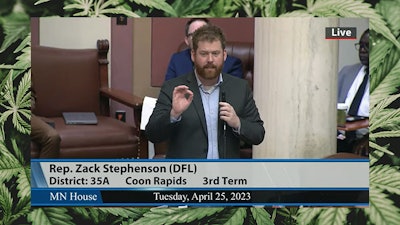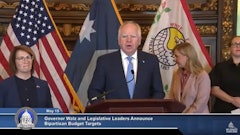
Minnesota’s prospects to legalize adult-use cannabis are as great as they’ve ever been.
State lawmakers voted, 71-59, April 25 on the House floor to approve a 300-plus page bill that would allow adults 21 and older to purchase up to 2 ounces of cannabis from licensed retailers, create a state agency to oversee a regulated marketplace, and provide expungement for cannabis-related convictions.
The vote came after nearly three hours of floor debate the night before—when 18 amendments were considered with four passing—and after the legislation, House File 100, survived the gauntlet of 16 committee hearings, including one committee that approved the measure twice, since its introduction in January.
The four amendments that passed Monday include: making fentanyl testing strips more widely available; removing a two-driver requirement for hemp-derived edible transporter licenses; prohibiting the director of the state’s Office of Cannabis Management (OCM) from registering as a lobbyist for four years before and two years after serving in that role; and criminalizing the presence of cannabis in one’s system for school bus drivers.
Among the amendments that were defeated were proposals to increase the minimum age from 21 to 25 years for adult-use cannabis, add THC potency caps, scale back social equity licensing measures, and provide municipalities more local control: The current version of the bill does not allow local opt-outs.
Rep. Zack Stephenson, a member of the state’s Democratic-Farmer-Labor (DFL) Party who sponsored the bill, with 32 of his colleagues signed on as co-sponsors, said before Tuesday's vote that Minnesota's cannabis laws are broken.
"Prohibition has failed," he said. "It’s not achieving any of its goals. And its costs, both in terms of dollars and in human costs, are overwhelming. If you support prohibition because you want to limit cannabis use, you must reckon with the reality that we have 50 years of evidence that the criminal justice system cannot achieve this goal. I say that as a prosecutor. The criminal justice system cannot achieve that goal. If it could, don’t you think it would have done it by now?”
While the Minnesota House passed similar legislation in May 2021, a former companion bill never received a committee hearing in the GOP-controlled Senate and, in May 2022, was blocked from a floor vote by Republicans in the upper chamber.
But the Minnesota Senate flipped to Democratic control in the November 2022 election. Under new leadership, new companion legislation, Senate Fill 73, sponsored by Sen. Lindsey Port, DFL, is now trending closely behind H.F. 100. The Senate legislation is scheduled for its 13th and final stop April 26 in the Finance Committee before a possible floor vote later this week or early next week.
H.F. 100 and S.F. 73—once twin bills when they were introduced—now include differences from various committee amendments. Those asymmetries would need to be reconciled in a conference committee should S.F. 73 receive final passage in the Senate.
Expecting just that, Democratic Gov. Tim Walz, a legalization proponent, recently indicated he would sign a final compromise bill should one arrive on his desk, putting the North Star State among 22 others that have legalized adult-use cannabis in the U.S.
Minnesotans are ready to legalize adult-use cannabis and expunge cannabis convictions in Minnesota.
— Governor Tim Walz (@GovTimWalz) April 20, 2023
I’m ready to sign it into law.
What House File 100 Aims to Enact
In addition to a 2-ounce purchase limit for cannabis flower, H.F. 100 would allow Minnesotans 21 and older to buy up to 8 grams of concentrate or 800 milligrams of THC in edible products per visit at a licensed dispensary, according to bill’s language.
The home cultivation of up to eight cannabis plants (four mature) would also be allowed.
The House and Senate versions differ with respect to at-home possession limits, set at 1 1/2 pounds and 2 pounds, respectively, for cannabis flower in an individual’s private residence, according to the bills.
Equivalently, the bills aim to establish an Office of Cannabis Management (OCM) by July 1, 2023, for regulatory oversight of a forthcoming adult-use program as well as the state’s existing medical cannabis program. Enacted legislation would establish a cannabis advisory council, require specific studies and reports, and set up a state-wide monitoring system (Metrc is the current track-and-trace provider for the state’s medical program).
Under H.F. 100, Cannabis sales would be taxed at 8% at retail through June 30, 2027, while S.F. 73 aims to establish a 10% tax rate that would be fixed. After the sunset date established in the House version, the Minnesota Department of Revenue commissioner would set a new tax rate that would equal the projected revenue to fund various state departments charged with the ongoing regulation of a legalized industry based on the most recent completed fiscal year at the time, according to the bill’s language.
The legislation also proposes 15 licensing categories that include provisions for a social equity program that aims to ensure individuals and communities most harmed by prohibition have an opportunity to engage in the industry. A special scoring structure for licensing would be in place for applicants who meet social equity criteria.
The OCM would be responsible for licensing the number of cannabis businesses necessary “in order to ensure the sufficient supply of cannabis flower and cannabis products to meet demand, provide market stability, ensure a competitive market, and limit the sale of unregulated cannabis flower and cannabis products,” according to the bill.
In addition to taxes, the state would collect revenue through application and licensing fees. For cultivators, those fees would include $10,000 for applications, $20,000 for an initial license and $30,000 to renew a license.
Similarly, those fees would be $2,500, $2,500 and $5,000 for retailers; $10,000, $10,000 and $20,000 for manufacturers; $5,000, $5,000 and $10,000 for wholesalers; and $500, $0 and $2,000 for microbusinesses.
Through committee amendments, both H.F. 100 and S.F. 73 added another license type called “cannabis mezzobusiness” that would allow medium size businesses to become vertically integrated with fees of $5,000, $5,000 and $10,000 for applications, an initial license and renewals, respectively.
A cannabis cultivator license holder would be allowed to grow up to 15,000 square feet of plant canopy indoors—with the OCM having the authority to increase that limit to 30,000 cubic feet—whereas cannabis mezzobusiness licensees would be allowed to grow up to 5,000 square feet indoors, with the OCM having the authority to increase that limit to 15,000 cubic feet.
Microbusinesses would be allowed to cultivate up to 2,000 square feet indoors with potential for the OCM to increase that limit to 5,000 square feet.
The legislation aims to establish plant propagation standards, including certification, testing and labeling requirements for methods used to grow new cannabis plants. Requirements for agricultural best practices and environmental standards are also outlined in the bills.
While local governments would be allowed to regulate where and how cannabis businesses could operate in their jurisdictions, they would not be allowed to ban cannabis businesses altogether—a key regulatory ingredient to eliminating the illicit market, Stephenson said Monday on the House floor.
As part of the aim to undo harms caused by prohibition, the legislation would provide for automatic expungement of certain cannabis offenses. The Bureau of Criminal Apprehension would be tasked with identifying eligible individuals whose records qualify for an order of expungement, according to H.F. 100 language.
Under current Minnesota law, possessing 42.5 grams (1.5 ounces) or less is a misdemeanor offense punishable by up to a $200 fine, according to advocacy group NORML. Possessing greater amounts is a felony offense punishable by five years in prison (or more if the possession is greater than 10 kilograms).
Join us this year at the Paris Las Vegas Hotel & Casino for Cannabis Conference, the leading education and expo event for plant-touching businesses.


























